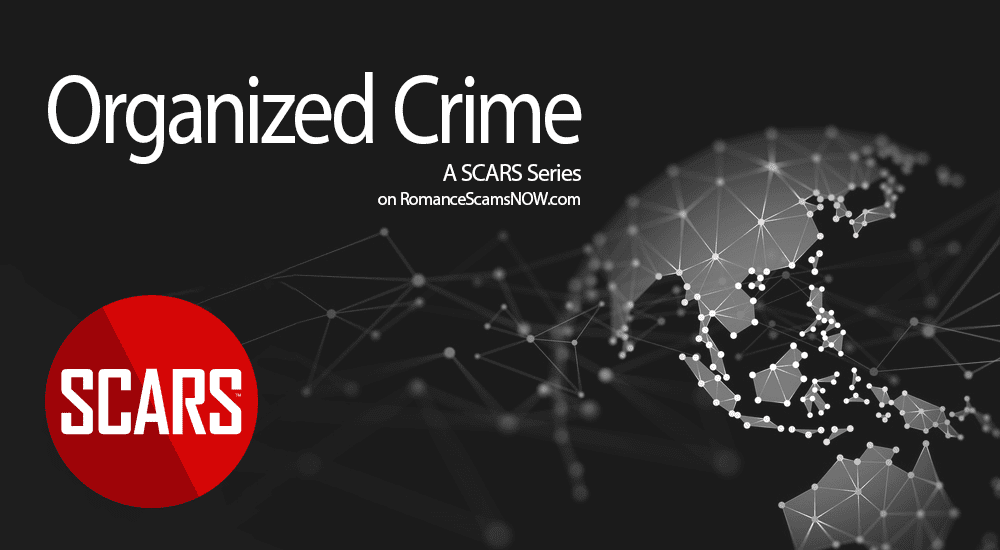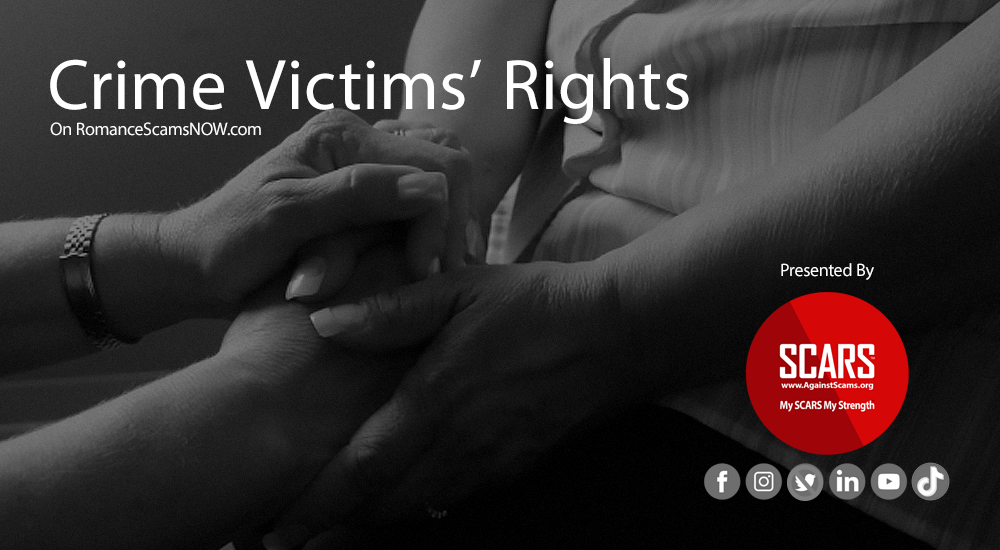
SCARS Institute’s Encyclopedia of Scams™ Published Continuously for 25 Years

Legitimizing Victim Counsel in 2023
SCARS NOTE: The following discussion of Crime Victim Rights is to present one aspect of those rights, the right of victims to have an attorney representing them in the criminal justice system.
Why Crime Victims Should Have Representation
Navigating the criminal justice system can be a daunting and overwhelming experience for crime victims. Having an attorney to represent them throughout the process can provide invaluable support, guidance, and protection. Here are some of the key reasons why it is important for crime victims to have an attorney:
-
Understanding the Criminal Justice Process: The criminal justice system is complex and often confusing, especially for those who have never been involved in it before. An attorney can explain the intricacies of the legal process, the roles of different parties, and the victim’s rights and options.
-
Protecting Rights and Interests: Crime victims have certain rights and interests throughout the criminal justice process. An attorney can ensure that these rights are protected, advocate for the victim’s best interests, and help them navigate the system effectively.
-
Gathering Evidence and Preparing for Court: An attorney can gather evidence, interview witnesses, prepare legal documents, and represent the victim in court proceedings, ensuring that the victim’s perspective is heard and considered.
-
Communication and Support: An attorney can provide ongoing communication and support to the victim, answering questions, addressing concerns, and offering emotional support throughout the often-lengthy legal process.
-
Seeking Restitution: In cases where the victim has suffered financial losses or other damages, an attorney can help the victim seek restitution from the offender through court proceedings.
-
Peace of Mind: Having an experienced attorney to handle the legal aspects of the case can provide peace of mind and allow the victim to focus on their recovery and healing.
In addition to these general benefits, having an attorney can be particularly important for crime victims in specific situations, such as:
-
Victims of serious crimes: Victims of violent crimes, sexual assault, or other serious offenses may need additional support and advocacy from an attorney to navigate the complexities of their cases.
-
Victims with limited resources: Victims who lack financial resources or have limited access to legal services may benefit from pro bono or court-appointed attorneys to ensure they have legal representation.
-
Victims facing unique challenges: Victims who are immigrants, have disabilities, or face other challenges may need specialized legal assistance to address their specific needs and ensure they are treated fairly.
Overall, having an attorney to represent crime victims throughout the criminal justice process can provide a multitude of benefits, ensuring that their rights are protected, their voices are heard, and their interests are represented.
To find an attorney that will represent crime victims, go to your state or provincial bar association website and search for victims attorneys, and also for ‘pro bono’ for those that do not charge for their services.
About Crime Victim Representation
The following was provided with the permission of the National Crime Victim Law Institute
By Kazi Houston, MSW, JD, Legal Director, Emily Tofte Nestaval, MSW, Executive Director
Rocky Mountain Victim Law Center
Rocky Mountain Victim Law Center (RMvlc) has a mission to elevate victims’ voices, champion their rights, and transform the systems impacting them by providing free legal services to victims of crime across Colorado. Since incorporation in 2009, RMvlc has represented victims in criminal cases across the state, litigating issues related to victim privacy, the right to be present and heard, the right to restitution, and more. As counsel for victims in cases, we work hard to build and maintain strong collaborative relationships with prosecutors, and often work together to identify the unique victims’ rights and victim privacy issues we can litigate most effectively.
Recently, and for the first time in the 14-year history of the organization, the role of RMvlc to act as victim counsel and our ability to litigate victims’ rights issues was challenged by the prosecution. It was a jarring experience after many years of collaboration and successful partnership with that prosecutor’s office, but it also created an opportunity to fully define our role as victim counsel and lay out the legal arguments that make it both possible and essential. With a short timeline, we were able to connect with NCVLI’s invaluable experts, who helped us think through our response and provided helpful sample motions.
Colorado has had a robust Victim Rights Act (VRA) since it became part of our state Constitution in 1992. Since the enabling legislation went into effect in 1993, the VRA has been updated multiple times to ensure the rights of victims evolve along with other changes in the legal system. As victim counsel we generally operate from a largely unarticulated belief that victims’ rights are important, and fighting for them is appropriate and right. However, the exercise of having to more fully explain why that is the case was useful.
It is not uncommon, after RMvlc enters a case, to have a candid conversation with the prosecution to explain, no—we are not the victim rights complaint people, we are not trying to sue anyone, and we are not trying to encumber prosecutorial authority and discretion. Our team spends a great deal of time, in cases, and through trainings and collaborative partnerships, talking about how ensuring victims have a means to protect their own interests improves their participation in and satisfaction with the legal system. Most often, this results in strong collaborative partnerships, even where our client’s position differs from the prosecution’s.
RMvlc also has a keen focus on providing victim-centered and trauma-informed legal services. An additional complexity in this case was maintaining the positive relationship between the survivor and the prosecution team. While RMvlc viewed the challenge to our representation as an existential threat to all victims and their rights throughout Colorado, the survivor wanted nothing but harmony between our team and the prosecution, which is a vital part of feeling supported, heard, and respected as they participate in the criminal legal system. RMvlc’s team of non-attorney advocates and trauma experts played a significant role in strategizing how RMvlc could fiercely refute the motion to strike, while also maintaining the victims wishes. Ultimately, RMvlc explained to the survivor the significance of the prosecution’s filing, the importance of RMvlc responding to it, and commiserated with the survivor the injustice of it being her case in which the prosecution brought this motion, and that sometimes lawyers just have to litigate things.
Striking a nuanced tone of maintaining the prosecution was still on her side, but didn’t want her to be able to assert her rights was complicated.
RMvlc developed clear arguments that victims are proper participants in criminal proceedings, with specific legal interests distinct from parties in a case. Drawing on a small body of Colorado VRA case law, we were also able to point to the philosophical underpinnings of those decisions, which consistently validate victims’ rights, and those rights should be upheld.
Recently the Colorado Supreme Court reviewed a case related to an un-subpoenaed victim being ordered to testify at a preliminary hearing when they exercised their right to be present. The trial court had relied on a pre-VRA case to allow this, but on an interlocutory appeal the Supreme Court noted the VRA was a “game changer” and a “sea change” in Colorado, and to rely on the pre-VRA case “would be to undercut the right to attend critical stages of proceedings under the VRA”, and “would be inconsistent with the constitutional and statutory goal of honoring and protecting victims”. People v. Platteel, 528 P.3d 176 (Colo. 2023). This strong affirmation of the need to address legal decisions and case law through the lens of the later enacted VRA is an important addition to Colorado’s body of law.
It was also uniquely satisfying to be able to lay out Constitutional and due process arguments drawing on century-old principles related to standing and access to legal protection. The unexpected opportunity to quote Marbury v. Madison provided very useful framing for the importance of remedies in making rights meaningful.
Concerns raised by the prosecution and defense in our case focused on the vague prospect that RMvlc might file something related to an evidentiary issue that could adversely affect the pending criminal case. Despite our repeated verbal and written assurances that our role is focused on the rights of the victim, and that the court is the gatekeeper and decider of such matters, the role of victim counsel continued to pose an unarticulated threat to everyone involved in the case. Ultimately the Court ruled that, because the victim is not a party to the case, RMvlc cannot file “motions”, but we can file notices to inform the court of concerns related to victims’ rights, and the position of the victim on issues.
The experience of having to justify the very existence of victim counsel was new for us, in a state where victims’ rights have not had to face many of the challenges experienced in other states. It was also a good reminder that, no matter how robust your VRA statutes are, there is always more work to do. Colorado doesn’t have explicit standing for victims related to enforcement of their VRA rights, and the existing compliance process does nothing to change the outcome of a case or remedy rights violations when they occur. Relying solely on past experiences, collaborative relationships, and trust to ensure victims have robust rights in the future is risky. To truly legitimize victims’ rights, and the role of victim counsel, efforts need to extend beyond work in individual cases, to ensure the laws, policies, and systems are in place to make victims’ rights meaningful. Because, as Justice Marshall quoted, “every right, when withheld, must have a remedy, and every injury its proper redress.” Marbury v. Madison, 5 U.S. (1 Cranch) 137, 163 (1803) (Quoting with approval from Blackstone’s commentaries).
The work continues in 2023.
Survey Of Select State Laws Governing Crime Victims’ Right To Counsel
[pdf-embedder url=”https://romancescamsnow.com/wp-content/uploads/2023/11/Survey-of-Select-State-Laws-Governing-Victims-Right-to-Counsel-2023-3.pdf” title=”SURVEY OF SELECT STATE LAWS GOVERNING CRIME VICTIMS’ RIGHT TO COUNSEL “]
More:
- United States Crime Victims’ Rights Laws by State or Territory (romancescamsnow.com)
- SCARS™ Guide: United States Crime Victims Rights & Assistance By State [UPDATED] (romancescamsnow.com)
- Did The FBI on IC3.gov Ignore Your Crime Victims’ Rights? (romancescamsnow.com)
- Romance Scam Crime Victim’s Bill of Rights (romancescamsnow.com)
- Scam Victims Must Always Tell The Truth When Talking With Law Enforcement (romancescamsnow.com)
- Impact of Crime Victimization (romancescamsnow.com)
- Victimology – What Is It? (scamsnow.com)
- National Crime Victim Law Institute (NCVLI)
-/ 30 /-
What do you think about this?
Please share your thoughts in a comment below!
LEAVE A COMMENT?
Thank you for your comment. You may receive an email to follow up. We never share your data with marketers.
Recent Comments
On Other Articles
- on Love Bombing And How Romance Scam Victims Are Forced To Feel: “I was love bombed to the point that I would do just about anything for the scammer(s). I was told…” Feb 11, 14:24
- on Dani Daniels (Kira Lee Orsag): Another Scammer’s Favorite: “You provide a valuable service! I wish more people knew about it!” Feb 10, 15:05
- on Danielle Delaunay/Danielle Genevieve – Stolen Identity/Stolen Photos – Impersonation Victim UPDATED 2024: “We highly recommend that you simply turn away form the scam and scammers, and focus on the development of a…” Feb 4, 19:47
- on The Art Of Deception: The Fundamental Principals Of Successful Deceptions – 2024: “I experienced many of the deceptive tactics that romance scammers use. I was told various stories of hardship and why…” Feb 4, 15:27
- on Danielle Delaunay/Danielle Genevieve – Stolen Identity/Stolen Photos – Impersonation Victim UPDATED 2024: “Yes, I’m in that exact situation also. “Danielle” has seriously scammed me for 3 years now. “She” (he) doesn’t know…” Feb 4, 14:58
- on An Essay on Justice and Money Recovery – 2026: “you are so right I accidentally clicked on online justice I signed an agreement for 12k upfront but cd only…” Feb 3, 08:16
- on The SCARS Institute Top 50 Celebrity Impersonation Scams – 2025: “Quora has had visits from scammers pretending to be Keanu Reeves and Paul McCartney in 2025 and 2026.” Jan 27, 17:45
- on Scam Victims Should Limit Their Exposure To Scam News & Scammer Photos: “I used to look at scammers photos all the time; however, I don’t feel the need to do it anymore.…” Jan 26, 23:19
- on After A Scam, No One Can Tell You How You Will React: “This article was very informative, my scams happened 5 years ago; however, l do remember several of those emotions and/or…” Jan 23, 17:17
- on Situational Awareness and How Trauma Makes Scam Victims Less Safe – 2024: “I need to be more observant and I am practicing situational awareness. I’m saving this article to remind me of…” Jan 21, 22:55
ARTICLE META
Important Information for New Scam Victims
- Please visit www.ScamVictimsSupport.org – a SCARS Website for New Scam Victims & Sextortion Victims
- Enroll in FREE SCARS Scam Survivor’s School now at www.SCARSeducation.org
- Please visit www.ScamPsychology.org – to more fully understand the psychological concepts involved in scams and scam victim recovery
If you are looking for local trauma counselors please visit counseling.AgainstScams.org or join SCARS for our counseling/therapy benefit: membership.AgainstScams.org
If you need to speak with someone now, you can dial 988 or find phone numbers for crisis hotlines all around the world here: www.opencounseling.com/suicide-hotlines
A Note About Labeling!
We often use the term ‘scam victim’ in our articles, but this is a convenience to help those searching for information in search engines like Google. It is just a convenience and has no deeper meaning. If you have come through such an experience, YOU are a Survivor! It was not your fault. You are not alone! Axios!
A Question of Trust
At the SCARS Institute, we invite you to do your own research on the topics we speak about and publish, Our team investigates the subject being discussed, especially when it comes to understanding the scam victims-survivors experience. You can do Google searches but in many cases, you will have to wade through scientific papers and studies. However, remember that biases and perspectives matter and influence the outcome. Regardless, we encourage you to explore these topics as thoroughly as you can for your own awareness.
Statement About Victim Blaming
SCARS Institute articles examine different aspects of the scam victim experience, as well as those who may have been secondary victims. This work focuses on understanding victimization through the science of victimology, including common psychological and behavioral responses. The purpose is to help victims and survivors understand why these crimes occurred, reduce shame and self-blame, strengthen recovery programs and victim opportunities, and lower the risk of future victimization.
At times, these discussions may sound uncomfortable, overwhelming, or may be mistaken for blame. They are not. Scam victims are never blamed. Our goal is to explain the mechanisms of deception and the human responses that scammers exploit, and the processes that occur after the scam ends, so victims can better understand what happened to them and why it felt convincing at the time, and what the path looks like going forward.
Articles that address the psychology, neurology, physiology, and other characteristics of scams and the victim experience recognize that all people share cognitive and emotional traits that can be manipulated under the right conditions. These characteristics are not flaws. They are normal human functions that criminals deliberately exploit. Victims typically have little awareness of these mechanisms while a scam is unfolding and a very limited ability to control them. Awareness often comes only after the harm has occurred.
By explaining these processes, these articles help victims make sense of their experiences, understand common post-scam reactions, and identify ways to protect themselves moving forward. This knowledge supports recovery by replacing confusion and self-blame with clarity, context, and self-compassion.
Additional educational material on these topics is available at ScamPsychology.org – ScamsNOW.com and other SCARS Institute websites.
Psychology Disclaimer:
All articles about psychology and the human brain on this website are for information & education only
The information provided in this article is intended for educational and self-help purposes only and should not be construed as a substitute for professional therapy or counseling.
While any self-help techniques outlined herein may be beneficial for scam victims seeking to recover from their experience and move towards recovery, it is important to consult with a qualified mental health professional before initiating any course of action. Each individual’s experience and needs are unique, and what works for one person may not be suitable for another.
Additionally, any approach may not be appropriate for individuals with certain pre-existing mental health conditions or trauma histories. It is advisable to seek guidance from a licensed therapist or counselor who can provide personalized support, guidance, and treatment tailored to your specific needs.
If you are experiencing significant distress or emotional difficulties related to a scam or other traumatic event, please consult your doctor or mental health provider for appropriate care and support.
Also read our SCARS Institute Statement about Professional Care for Scam Victims – click here to go to our ScamsNOW.com website.
















At this time I am not seeking an attorney. This information is useful however, in the event something does come up in my case making it necessary for me to seek an attorney.
My search for a lawyer who will work on a contingency basis has not yet produced any results.